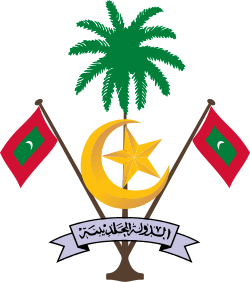Culture of the Maldives
The culture of the Maldives is derived from a number of sources, the most important of which is its proximity to the shores of Sri Lanka and South India. The population is mainly Indo-Aryan from the anthropological point of view.
Influences
Language
The Dhivehi language is of Indo-Iranian Sanskritic origin and therefore closely related to Sinhala, which points at a later influence from the north of the subcontinent. According to legends, the kingly dynasty that ruled the Maldives in the past has its origin there.
Buddhism
These ancient kings may have brought Buddhism from the subcontinent, but it is not clear. In Sri Lanka, there are similar legends, but it is improbable that the ancient Maldive royals and Buddhism came both from that island, because none of the Sri Lankan chronicles mentions the Maldives. It is unlikely that the ancient chronicles of Sri Lanka would have failed to mention the Maldives, if a branch of its kingdom had extended itself to the Maldive Islands.
Arabian
Since the 12th century AD, there have also been influences from Arabia in the language and culture of the Maldives, because of the general conversion to Islam at that time, and its location as a crossroads in the central Indian Ocean.
African
In the islands' culture, there are a few elements of African origin as well, from slaves brought to the court by the Royal family and nobles from their Hajj journeys to Arabia in the past. There are islands like Feridhu and Maalhos in Northern Ari Atoll, and Goidhu in Southern Maalhosmadulhu Atoll where many of the inhabitants trace their ancestry to released African slaves.[1]
Music and dance
Culturally, Maldivians feel some affinity to Northern India through their language, which is related to the languages of North India. Most older generation Maldivians like to watch Hindi movies and listen to Hindi songs. Many popular Maldivian songs are based on Hindi tunes. The reason is that out of a similar language, similar rhythms and cadences develop. In fact, it is very easy for Maldivians to fit local lyrics to a Hindi song. Bollywood songs are among the most popular songs in Maldives, especially the old ones from Mohammad Rafi, Mukesh, Lata Mangeshkar, and Asha Bhonsle. Therefore, most local Maldivian dances and songs are based in (or influenced by) North Indian Kathak dances and Hindi songs.
The favourite musical instrument of Maldivians is the bulbul, a kind of horizontal accordion. This instrument is also used to accompany devotional songs, like Maulūd and Maadhaha. The Bodu Beru (literally "Big Drum") drumming performances are said to have African roots.
Marriage and divorce
Maldivian culture shares many aspects of a strong matriarchal tradition with ancient Dravidian culture. A unique feature of Maldivian society is a very high divorce rate, which has been attributed by some as due to early marriage. Others have seen this extremely high divorce rate as reflecting the combination of liberal Islamic rules about divorce and the relatively loose marital bonds that may be produced by the lack of a history of fully developed agriculture and the accompanying codes of agrarian honor and property relations.[2]
Cuisine
The cuisine of Maldives is mainly fish as the fishing industry is the second-largest industry in the country. Daily meals include rice and fish, the most common foods, with fish being the most important source of protein in the average diet. Very few vegetables are eaten due to a lack of farming land in the country. Elders smoke guduguda, an elongated pipe that goes through a trough of water. Most food served in tourist resorts is imported. On ceremonial occasions, meat other than pork is eaten. Alcohol is not permitted except at tourist resorts. The local brew raa is consumed instead of alcoholic beverages. Basic commodities such as rice, sugar, and flour are imported.
Film industry
The Maldives has its own film industry.
References
- ↑ Xavier Romero-Frias, The Maldive Islanders, A Study of the Popular Culture of an Ancient Ocean Kingdom. Barcelona 1999, ISBN 84-7254-801-5
- ↑ Marcus, Anthony. 2012. “Reconsidering Talaq: Marriage, Divorce and Sharia Reform in the Republic of Maldives” in Chitra Raghavan and James Levine. Self-Determination and Women’s Rights in Muslim Societies. Lebanon, NH: Brandeis University Press
- Divehiraajjege Jōgrafīge Vanavaru. Muhammadu Ibrahim Lutfee. G.Sōsanī. Male' 1999.
- HCP Bell, The Maldive Islands, An account of the physical features, History, Inhabitants, Productions and Trade. Colombo 1883, ISBN 81-206-1222-1
- Xavier Romero-Frias, The Maldive Islanders, A Study of the Popular Culture of an Ancient Ocean Kingdom. Barcelona 1999, ISBN 84-7254-801-5
- Divehi Tārīkhah Au Alikameh. Divehi Bahāi Tārikhah Khidmaiykurā Qaumī Markazu. Reprint 1958 edn. Male’ 1990.
